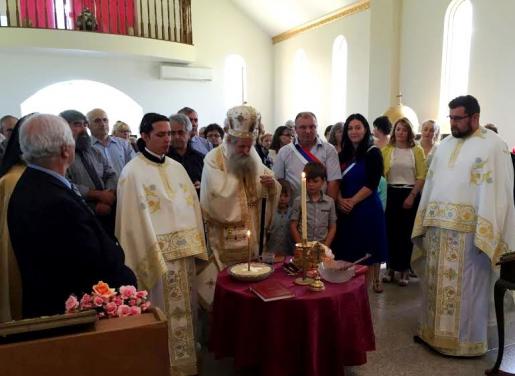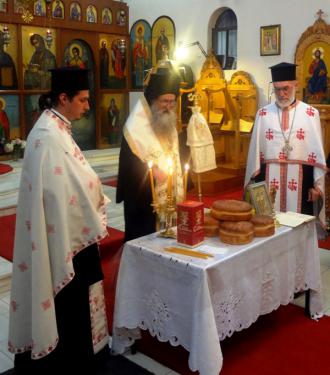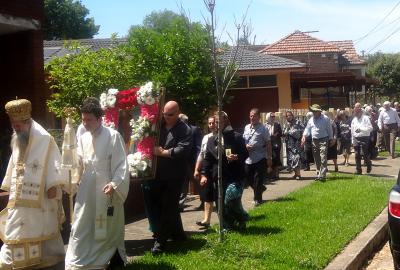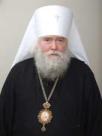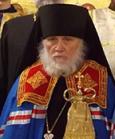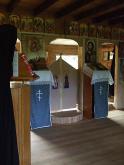Sunday, November 30, 2014
Schedule of services - Sydney
Upcoming services at St John of Kronstadt Parish, Sydney
Wednesday 03.12. Presentation of the Most-Holy Theotokos. Vigil 6 pm
Thursday 04.12. Presentation of the Most-Holy Theotokos. Divine Liturgy - 7am
Saturday 06.12 26th Sunday after Pentecost. Vigil - 5 pm
Sunday 07.12. 26th Sunday after Pentecost Divine Liturgy - 8 am
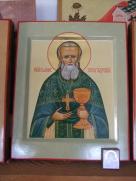 See also all news regarding the Sydney parish
See also all news regarding the Sydney parish
or Fr Nebojsa’s facebook page
For more details, please contact the rector, Fr Nebojsa Mirkovic.
Wednesday, November 26, 2014
Parish Feast - Church of St Stefan Decanski, Carrum Downs
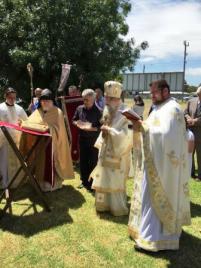 The Free Serbian parish of St King Stefan Decanski in Carrum Downs (True Orthodox Christians of Greece / Free Serbian Orthodox Diocese of Australia and New Zealand) celebrated its parish feast liturgically on Sunday 23.11 (n.s.).
The Free Serbian parish of St King Stefan Decanski in Carrum Downs (True Orthodox Christians of Greece / Free Serbian Orthodox Diocese of Australia and New Zealand) celebrated its parish feast liturgically on Sunday 23.11 (n.s.).
His Eminence, Bishop Ambrose presided at the Divine Liturgy, with igumen John (Smelic)(ROCA), Igumen Christopher (Nedjic), and priest Bojan (Vlajic) concelebrating.
Many faithful were in attendance, among them also Greeks and Russians.
Monday, November 24, 2014
Pilgrimage to the Holy Land 16th-24th July 2015
Our Greek sister Church, the Church of the True Orthodox Christians of Greece, is arranging a pilgrimage to the Holy Land in July 2015.
The pilgrimage will be led by Bishop Ambrose, and all the guiding, explanations, etc will be given in English.
The pilgrims should arrive in Tel Aviv, where the pilgrimage will begin, whether directly from Australia or from Europe, by 12noon of 16th July. Departure will be on the 24th July.
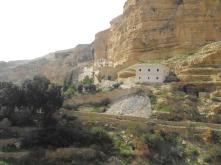 The exact order of the visits will be arranged later, but the pilgrimage will include the following Holy Places:
The exact order of the visits will be arranged later, but the pilgrimage will include the following Holy Places:
Jerusalem: Church of the Anastasis, Holy Sepulchre, Golgotha, Sion, Tomb of the Mother of God, Gethsemane, Mount of Olives, place of the Ascension, Jerusalem monasteries.
Bethlehem: Cave of the Nativity, St. Theodosios’ Monastery, St. Savva’s Monastery, Bethany, Convent and Tomb of Lazarus, (and if possible Hebron and Abraham’s Oak).
Jericho: Mount of Temptation, Hozeva Monastery, St. Gerasimos’ Monastery, Sycamore of Zachaios, Jordan river.
Galilee: Nazareth, Cana, Mount Tabor, Capernaum, Sea of Galilee, Tiberias.
Nablus (Samaria): Well of Jacob
Lydda: Tomb of St. George
Sinai: St. Catherine’s Monastery, and ascent of Mount Sinai.
Included in the price: Comfortable hotel accommodation in two-bedded rooms (supplement for single), breakfast and evening meal each day, transport by coach to all the places mentioned above, taxi up Mount Tabor, taxi to St. Savva’s Monastery, cruise on Sea of Galilee, lunch in Tiberias, tips.
All visitors should have an Australian, New Zealand or European passport valid for at least six months after the date of the pilgrimage. The number of pilgrims will be limited to 50.
PRICE: 780 EUROS or 1140 AUD at present rates.
For participation, please contact our agents: Andreas and Maria Kakliakmanis, tel.+30-6988-621148.
I hope that John Banjanin, tel. 0061-0418441144, will help with the arrangements.
Please book as soon as possible. A deposit of $300 will assure your place.
Bishop Ambrose visits Protection Parish in Melbourne
On Monday 11/24 November Bishop Ambrose of Methoni (and Australia) visited the parish of the Three Martyrs of Vilnus. Concelebrating with him on the feast of the Iveron icon of the Mother of God, were Protopriest Stylianos, Hegumen John (Smelic), Hegumen Andrei (Erastov), and Hegumen Christofor (Nedjic).
Despite inclement weather and it being a weekday, many people showed their love for the Theotokos and the church by driving 2 hours in heavy traffic to arrive for the start of Matins at 830am. As well as Byelorussians and Russians, there were Greeks and Serbs attending.
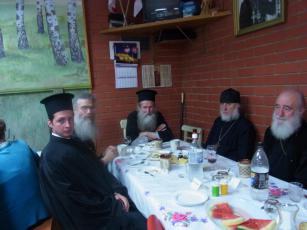 Bishop Ambrose gave an interesting sermon including an account of his personal contact with the well known myhrr-bearing copy of the Iveron icon of the Theotokos in the 1980’s, and its guardian brother Joseph of Montreal. His Eminence also talked about Holy FatherTheodore the Confessor 98-9th century) Abbot of the Studite monastery. Saint Theodore lived an exemplary monastic life and was abbot of the famous Studite monastery in Constantinople. He produced a vast amount of writings, including liturgical hymns, homilies, panegyrics, and instructions for monastic life. He suffered much from the iconoclasts, and was finally banished and exiled by the emperor.
Bishop Ambrose gave an interesting sermon including an account of his personal contact with the well known myhrr-bearing copy of the Iveron icon of the Theotokos in the 1980’s, and its guardian brother Joseph of Montreal. His Eminence also talked about Holy FatherTheodore the Confessor 98-9th century) Abbot of the Studite monastery. Saint Theodore lived an exemplary monastic life and was abbot of the famous Studite monastery in Constantinople. He produced a vast amount of writings, including liturgical hymns, homilies, panegyrics, and instructions for monastic life. He suffered much from the iconoclasts, and was finally banished and exiled by the emperor.
Tuesday, November 18, 2014
Bishop Ambrose’s visit to Parish of St John of Kronstadt
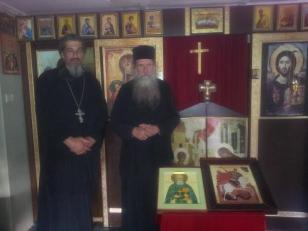 On the feast day of Saint George, 3/16.11.2014, His Eminence, Bishop Ambrose of Methoni, of the Church of the True Orthodox Christians of Greece and the Free Serbian Orthodox Diocese of Australia and New Zealand, visited our parish of St John of Kronstadt in Sydney.
On the feast day of Saint George, 3/16.11.2014, His Eminence, Bishop Ambrose of Methoni, of the Church of the True Orthodox Christians of Greece and the Free Serbian Orthodox Diocese of Australia and New Zealand, visited our parish of St John of Kronstadt in Sydney.
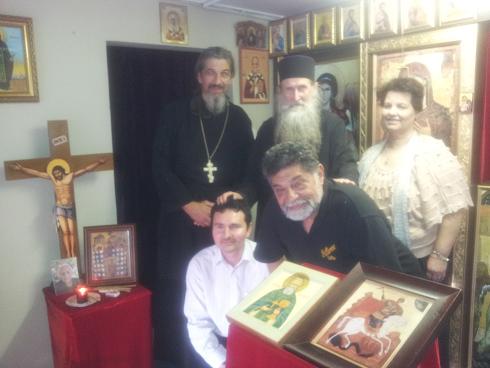
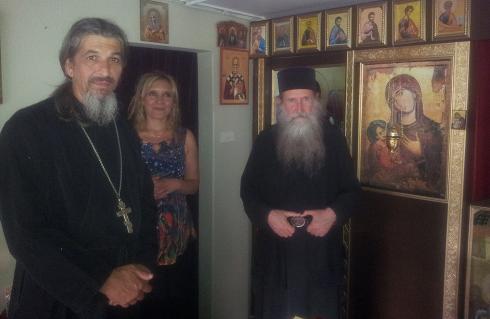
Priest Nebojsa Mirkovic
St John of Kronstadt Parish
Russian Orthodox Church Abroad, Sydney, Australia.
Parish feast - Church of Sts Cosmas and Damian, Sydney
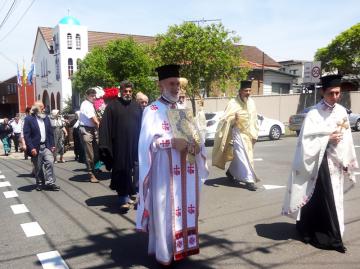 The Church of Saints Cosmas and Damian (True Orthodox Christians of Greece / Free Serbian Orthodox Diocese of Australia and New Zealand) in Sydney celebrated its parish feast on 1/14 November.
The Church of Saints Cosmas and Damian (True Orthodox Christians of Greece / Free Serbian Orthodox Diocese of Australia and New Zealand) in Sydney celebrated its parish feast on 1/14 November.
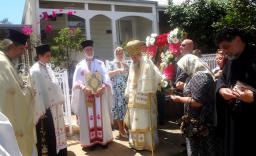 Bishop Ambrose of Methoni (and Australia) presided at the Divine services, with Protopresbyter Dragan Saracevic, Hegumen Christofor (Nedjic), and Priest Nebojsa Mirkovic (ROCA) concelebrating.
Bishop Ambrose of Methoni (and Australia) presided at the Divine services, with Protopresbyter Dragan Saracevic, Hegumen Christofor (Nedjic), and Priest Nebojsa Mirkovic (ROCA) concelebrating.
Monday, November 10, 2014
The Fathers on TRIALS and TEMPTATIONS
Destroy temptations and thoughts - and there will not be a single saint. The one who runs away from temptations runs from eternal life. This is why one of the Saints says: “Who gave the Holy Martyrs their crowns, if not their tormentors? Who gave St Stephen such glory, if not those who stoned him? He adds a saying from another Saint, who said: “I do not blame those who persecute me, instead, I call them my benefactors; and I do not reject the Doctor of souls, who gives my vain soul the medicine of dishonour, because I am afraid that He should say even to my soul: “We would have healed Babylon, but she is not healed” (Jeremiah 51:9); and again: “how often would I have gathered thy children together, as a hen doth gather her brood under her wings, and ye would not! Behold, your house is left unto you desolate” (Luke 13:34-35)
Venerable Zosima, who revealed the glory of St Mary of Egypt, 5th century
Suffering deliberately embraced cannot free the soul totally from sin unless the soul is also tried in the fire of suffering that comes unchosen. For the soul is like a sword: If it does not go “through fire and water” (Psalm 66:12 (LXX)) - that is, through suffering deliberately embraced and suffering that comes unchosen, - it cannot but be shattered by the blows of fortune.
Ilias the Presbyter, ?7th century
Just as sick people need surgery and cautery to recover the health they have lost, so we need trials, and toils of repentance, and fear of death and punishment, so that we may regain our former health of soul and shake off the sickness which our folly has induced. The more suffering, the more we should thank Him for His compassion and accept the suffering joyfully. For it is to help us that He increases our tribulation, both through the sufferings we willingly embrace in our repentance and through the trials and punishments not subject to our will. In this way, if we voluntarily accept affliction, we will be freed from our sickness and from the punishments to come, and perhaps even from present punishments as well. Even if we are not grateful, our Physician in His grace will still heal us, although by means of chastisement and manifold trials. But if we cling to our disease and persist in it, we will deservedly bring upon ourselves agelong punishment. We will have made ourselves like the demons and so will justly share with them the agelong punishments prepared for them; for, like them, we will have scorned our Benefactor.
St Peter of Damaskos, 11th century
Saturday, November 8, 2014
St Demetrius the Great-Martyr and Christian attitude to sensual pleasures
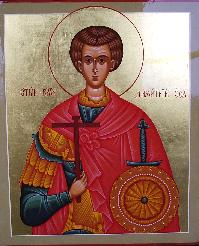 St Dimitri was a high-ranking official in Thessalonica. He not only cared for the people’s material well-being, but also taught them the Christian faith. This is why Emperor Maximian imprisoned him.
St Dimitri was a high-ranking official in Thessalonica. He not only cared for the people’s material well-being, but also taught them the Christian faith. This is why Emperor Maximian imprisoned him.
Emperor Maximian loved bodily and vain pleasures. He organised spectacles where Lyaeus, a giant, from a platform would throw innocent victims onto tightly-spaced, upright spears, so that they would be stabbed to death. However, a Christian youth, Nestor, was found who would deprive the Emperor of his favourite entertainment. It was Dimitri who blessed and encouraged this struggle, which culminated in Lyaeus the giant being killed by a weak teenager.
In the context of St Dimitri and St Nestor’s struggles, it is appropriate to ask ourselves: What is the Christian attitude to sensual pleasures?
a. The purpose of pleasures and entertainments is to give us an essential rest from work. Ever since the expulsion of man from paradise, hard work has been necessary.
..cursed is the ground for thy sake; in sorrow shalt thou eat of it all the days of thy life. Thorns also and thistles shall it bring forth to thee.
Genesis 3:17-18
Our work is usually associated with sweat and sorrows. The body requires rest to renew its strength, through food and sleep. The soul seeks to forget its sorrows and renew its powers in activities of a higher nature, such as art, which remind it of the perfection of Paradise. This is natural, or even essential, and therefore not to be condemned.
b. But before we give ourselves over to pleasures, we must ask ourselves, is our body and soul really exhausted from hard, but useful, important and unavoidable work? Should we allow it a deserved reward? Or is our life filled with boredom and heaviness of soul, the fruit of idleness rather than hard work? The Apostle says
…if any would not work, neither should he eat.
1 Thessalonians 3:10
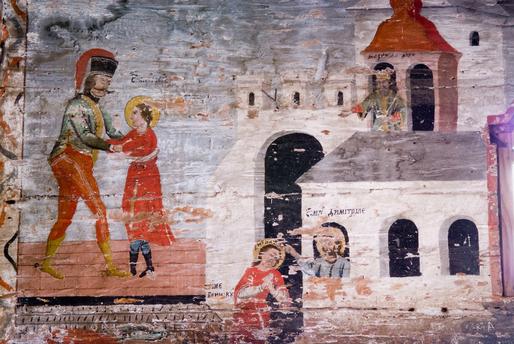
St Nestor defeats the giant Lyaeus. Bottom right: St Demetrius blessing St Nestor
c. Does the pleasure we propose strengthen us, and not, on the contrary, further exhaust our bodily powers? Will it lift up your soul, or will it weaken the mind? Will it enliven your heart with pure, deep and life-giving joy, making the soul ready and cheerful for work; good-tempered and patient in sorrows? If not, then it is better for the soul to deny itself such pleasure. The Apostle says:
All things are lawful for me, but all things are not expedient: all things are lawful for me, but all things edify not.
1 Corinthians 10:23
d. Will this pleasure distract us from some other, more important tasks? For example, our civil or spiritual duties? If it does, our pleasure is not only harmful, but directly criminal! If, when the Church calls him to glorification of God’s love and mercy, when She celebrates the greatest mysteries of our salvation, an Orthodox Christian spends his time in sensual pleasures, is this not an obvious disdain of the customs of the Church, and of God Himself? Such pleasure becomes a mockery of God, worthy of punishment.
e. However, the foremost danger in sensual pleasures is that they may bind our heart to themselves, becoming an inextricable need of our soul. They can deprive us of spiritual freedom, which a Christian must treasure more than everything. This freedom allows the Christian to be independent of everything earthly, so that he does not fear anything. He is the lord of his desires and feelings, the king of his internal world. Only this freedom allows him to conquer temptation. It is attainable by constant self-denial and patience, constant conquering of one’s own tendencies and cutting off one’s own will, and the ability to deny oneself in everything. If we always give in to our sensual desires, then we are submitting ourselves to pleasure, giving it power, and allowing it to become stronger, more demanding and persistent.
My brother Christians! Apart from the will of God, which governs us all, whatever else we are conquered by, leads to a shameful slavery for our God-like, reasonable and free soul. Giving in to fleshly pleasure and sinful passions is the same as selling ourselves as slaves to sin; may God save us from this.
Abridged from Protopriest G. Dyachenko: Full yearly cycle of short lessons.
26 October: St Demetrius, from the works of Demetrius of Cherson
Thursday, November 6, 2014
Feast of St Demetrius in Sydney
 The Parish of St John of Kronstadt in Sydney invites all for services in honour of the Holy Great-Martyr Demetrius.
The Parish of St John of Kronstadt in Sydney invites all for services in honour of the Holy Great-Martyr Demetrius.
7.November - Friday evening - All-night Vigil: 6 pm.
8. November - Saturday morning - Hours and Divine Liturgy: 9 am
Address: 20 Flat Rock Rd, Kingsgrove, NSW 2208
See also all news regarding the Sydney parish
or Fr Nebojsa’s facebook page
For more details, please contact the rector, Fr Nebojsa Mirkovic.
Tuesday, November 4, 2014
Bishop Averky on the Kazan Icon of the Mother of God
Bishop Averky, in his sermon on the Kazan Icon of the Mother of God, relates how Russia was saved by the Mother of God in the past. Today the Holy Church celebrate this miraculous occurrence. Vladika Averky continues to teach how we can save ourselves in our current and future troubles:
Russia was saved, many times, over the course of nearly a millenium, in all its difficult moments of history.
And this happened not only once, but many times!
But what do we see today?
Now, when a time even more difficult than the first and second tumultuous time has come upon Russia, there is no other, and cannot be any other salvation, apart from an even more fiery and heartfelt turning of all Russian people to the our true Protectress and Defender, the “quick Helper, ready and warm salvation, the Protection of the Virgin“(Kondak for the Kazan Icon of the Mother of God)And what prevents us from turning to Her in the same way that our ancestors turned to Her?
Only absence of faith and weak faith.
It is time for us to finally become sober, and understand that there is no other reliable path to the salvation of our homeland, Russia, apart from that path which our ancestors followed: It is the path of our universal prayerful appeal to the “calm and good haven - the Protection of the Virgin.
And let us make haste to prayer and speed to repentance. For the all-pure Theotokos poureth forth upon us inexhaustible mercies, She goeth before to help us and delivereth Her good-hearted and God-fearing servants from great misfortunes and evil.”(Kondak for the Kazan Icon of the Mother of God)Bishop Averky (Taushev), 20th century.
(The Contemporary World in the Light of the Word of God: Volume 1, page 420)
Editor’s neote: Vladika Averky is speaking about Russia in the wider sense of the word, beyond the geographical or political sense - not only encompassing the Russian Federation, but also, Ukraine, and all the Russian Orthodox people around the world.
It is important to not confuse this concept with the current “Русский мир”-initiative (”Russian world”) promoted by the Moscow Patriarchate, which unfortunately, is a political, and not a spiritual movement.
